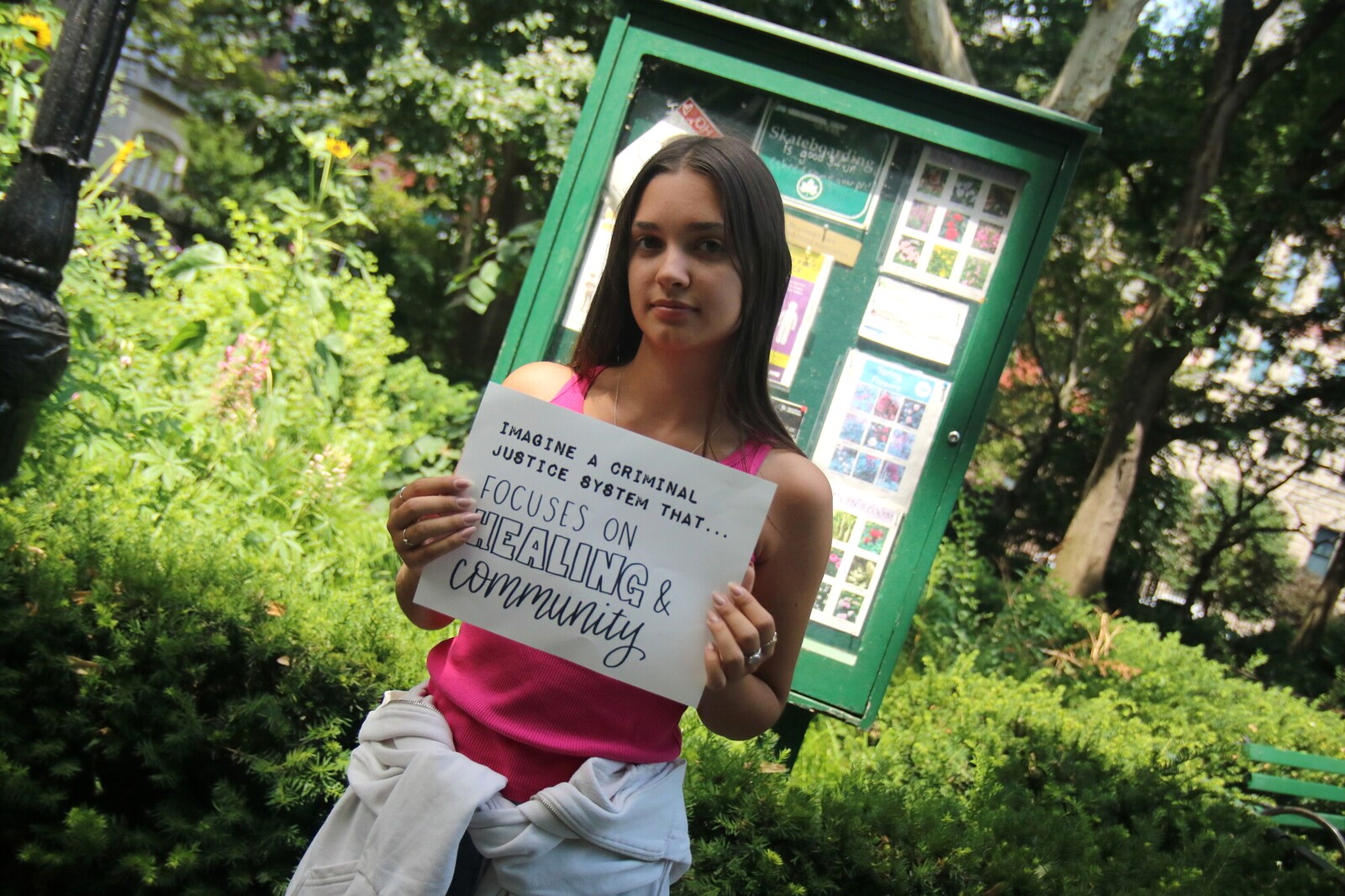
Jeremy Robins / Echoes of Incarceration
This summer, more than a dozen high school students are taking part in Liberation Summer Advocacy Camp in New York City. The program is hosted annually by AFSC and our partner Echoes of Incarceration. Most of the students have been personally impacted by the U.S. immigration system or criminal legal system. During the program, participants learn about the injustices in these systems—and how they can use photography, filmmaking, and other artforms to advocate for change.
In this essay, Alexandra Held-Villasenor shares her experience participating in the camp.
My involvement in Liberation Summer Camp began in 2019, right before the start of my junior year of high school. My initial interest in the camp stemmed from my experience as the daughter of two immigrants. The opportunity to not only flex my creative muscles, but to build the skills and knowledge required of effective advocacy, was one that I jumped at. Liberation Summer served not only as an introduction to photographic and creative skills, but also as an avenue through which I have strengthened my passions and beliefs. My experience has even helped cement my interest in attending law school, and the selection of my undergraduate major – political and social thought. Three years later, my involvement in Liberation Summer Camp continues, this time as a rising college junior at the University of Virginia.
In a fast-paced world of communication, mastering media has become a crucial part of advocacy. The intersection of media in advocacy is thoroughly explored and incorporated through the structure of the camp, which is evenly split between ‘media’ and ‘information.’ The weekdays alternate between camera training and filming, and information workshops or guest speakers. From the very beginning, campers begin producing photographs and short films and skits that are prompted by the information they learn. By the end of the summer, every camper will have been part of a team and produced a short film on a topic of their choice.
Last summer, I helped produce (and even starred in!) an instructional short film titled “Know Your Rights.” When considering what kind of film we wanted to make, the crew and I considered how we could convert a gameshow style into something powerful and instructional. Nearly everyone can enjoy a gameshow, whether as a participant or a viewer; shows like “Family Feud” and “Jeopardy” are known for their humorously compelling format and snappy one-liners. It was this thought that led us to consider a game show based on knowing your rights, specifically in the context of police encounters.
“Know Your Rights” is structured in a snappy and quick interview-style gameshow, where contestants are asked a set of questions designed to test their knowledge of civil rights in police encounters. The questions are simple and straight forward, with varying levels of difficulty. We threw in some softballs you might know from general pop culture, like “Do you have the right to remain silent if stopped and asked questions?” Others were more difficult, and even varied based on your location in the United States, like questions related to stop-and-frisk or filming of police encounters.
Contestants that answered incorrectly had to face a “wheel of doom,” which featured punishments like a whipped cream pie to the face and dried crickets. Despite the element of humor, we emphasized that the reality of consequences of police encounters can be much more dire. The game show culminates in the awarding of a “grand prize,” which is simply freedom. This ending is meant to showcase a more realistic consequence, parallel to what could happen in a real situation. In some cases, knowing your rights in police encounters could be the difference between life or death.
Our message resonated with a lot of people. And others helped us spread the word. Last summer, the film was screened every weekend at the Town Square Summer Starz Free Movie Nights in Greenpoint, a neighborhood of New York City. It was also recurrently screened in May, at the BRICS Concrete Stories Festival, where it was a finalist in the documentary film category. You can watch the video here.
I left that first summer with a new community comprised of my fellow participants and the Echoes and AFSC crew. The days we spent filled with corny icebreakers, jokes, UNO games at lunch, tough conversations, personal stories, learning, and creating left me with genuine connections and a strong network of support. It was a joy to watch that experience handed to a new set of campers last year, when I joined the camp as part of the Echoes of Incarceration team. It is with excitement that I return for my third year, ready to witness that once more. My hope is that this year’s campers leave equipped with not just new knowledge and practical advocacy skills, but also a community that they can always lean on.